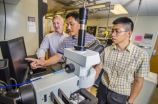(Press-News.org) The politically expedient way to mitigate climate change is essentially no way at all, according to a comprehensive new study by University of Chicago climatologist Raymond Pierrehumbert.
Among the climate pollutants humans put into the atmosphere in significant quantities, the effects of carbon dioxide (CO2) are the longest-lived, with effects on climate that extend thousands of years after emissions cease. But finding the political consensus to act on reducing CO2 emissions has been nearly impossible. So there has been a movement to make up for that inaction by reducing emissions of other, shorter-lived gasses, such as methane, hydrofluorocarbons, and nitrous oxide, and particulates such as soot and black carbon, all of which contribute to warming as well.
Pierrehumbert 's study shows that effort to be, as he puts it, a delusion. "Until we do something about CO2, nothing we do about methane or these other things is going to matter much for climate," he said.
Pierrehumbert is the Louis Block Professor in Geophysical Sciences at UChicago, and holder of the King Carl XVI Gustaf Chair in Environmental Sciences at Stockholm University for 2014-2015. His study, published in Annual Review of Earth and Planetary Sciences, brings together findings from the scientific literature with new research and analysis. Its conclusions are clear.
"Ray convincingly shows the benefit and importance of doing everything we can to lower CO2 emissions, and as soon as possible," said Katherine H. Freeman, professor of geosciences at Pennsylvania State University. "We should lower short-lived pollutants like methane too. But, as he makes clear, we should not let them distract us from the urgent need to stop burning fossil fuels."
The basic physics of climate pollutants has been well known for a long time. The warming effect of methane and other short-lived climate pollutants disappears quite quickly after the pollutants are removed from the atmosphere. When you remove them, you get a one-time-only, lump-sum benefit. CO2, on the other hand, lingers in the atmosphere. And if you are still emitting CO2 while you are reducing methane and its fellows, that additional CO2 continues to affect the climate for thousands of years.
Perhaps as a result of wishful thinking, the policy implications of those facts had
become confused, said Pierrehumbert. Part of the problem is that the statistical tool used to compare the climate effect of gasses is badly flawed. The measure, called Global Warming Potential (GWP), predicts the effect on climate by comparing the emission rate of carbon dioxide with the emission rate of methane. But a one-ton-per-year reduction in the amount of methane emitted translates into a single lowering of the global thermostat, while a one-ton-per-year reduction in CO2 yields a climate benefit that increases over time. That's because each extra ton of CO2 that would have been emitted would have irreversibly ratcheted up the global thermostat by an additional increment.
Despite its well-known defects, GWP has been used since 1990 and was incorporated into the Kyoto Protocols in the climate-trading schemes implemented by Europe. Pierrehumbert proposes a different metric, which looks at the climate effect of reducing CO2 emission by a fixed number of tons and then finds the rate by which you have to reduce methane emissions to get the same effect.
Pierrehumbert's study doesn't propose a single "right" policy on climate change, said Richard Alley, Evan Pugh Professor of Geosciences at Penn State. "But it is a very useful analysis that will be viewed carefully by people who are interested in making good policies, and the main conclusions will help inform those policies."
Pierrehumbert himself hopes that his work will help lead policymakers to abandon Kyoto-style multi-gas trading schemes, which treat the gasses equivalently, and put the emphasis on CO2 for the next 50 years or so. "I see puncturing the excessive enthusiasm about short-lived climate pollution control as a step in the right direction," he said, "because it takes away one of the grounds for procrastination on CO2. If you're serious about protecting climate, it's the CO2 you've got to deal with first."
INFORMATION:
Study: To address climate change, nothing substitutes for reducing CO2 emissions
2014-06-27
ELSE PRESS RELEASES FROM THIS DATE:
Some aggressive cancers may respond to anti-inflammatory drugs
2014-06-27
New research raises the prospect that some cancer patients with aggressive tumors may benefit from a class of anti-inflammatory drugs used to treat rheumatoid arthritis.
Studying triple-negative breast cancer, researchers at Washington University School of Medicine in St. Louis found that some aggressive tumors rely on an antiviral pathway that appears to drive inflammation, widely recognized for roles in cancer, rheumatoid arthritis and other inflammatory diseases.
The tumors that activate this particular antiviral pathway always have dysfunctional forms of the proteins ...
Diamond plates create nanostructures through pressure, not chemistry
2014-06-27
ALBUQUERQUE, N.M. — You wouldn't think that mechanical force — the simple kind used to eject unruly patrons from bars, shoe a horse or emboss the raised numerals on credit cards — could process nanoparticles more subtly than the most advanced chemistry.
Yet, in a current paper in Nature Communications, Sandia National Laboratories researcher Hongyou Fan and colleagues appear to have achieved a start toward that end.
Their newly patented and original method uses simple pressure — a kind of high-tech embossing — to produce finer and cleaner results in forming silver ...
Research may yield new ways to treat antibiotic-resistant TB
2014-06-27
CORVALLIS, Ore. – Scientists in the United States and India have successfully modified the precursor to one of the drugs used to treat tuberculosis, an important first step toward new drugs that can transcend antibiotic resistance issues that experts consider a serious threat to global health.
The findings, reported in the Journal of Biological Chemistry, indicate that a new compound, 24-desmethylrifampicin, has much better antibacterial activity than rifampicin against multi-drug-resistant strains of the bacteria that cause tuberculosis.
Rifampicin and related drugs ...
Youth regularly receive pro-marijuana tweets
2014-06-27
AUDIO:
Twitter has become one of the most popular social media sites among young people, and researchers at Washington University School of Medicine in St. Louis have been looking at Twitter....
Click here for more information.
Hundreds of thousands of American youth are following marijuana-related Twitter accounts and getting pro-pot messages several times each day, researchers at Washington University School of Medicine in St. Louis have found.
The tweets are cause for ...
A new species of moth from the Appalachian Mountains named to honor the Cherokee Nation
2014-06-27
A small, drab and highly inconspicuous moth has been flitting nameless about its special niche among the middle elevations of one of the world's oldest mountain ranges, the southern Appalachian Mountains in North America. A team of American scientists has now identified this new to science species as Cherokeea attakullakulla and described it in a special issue of the open access journal ZooKeys.
In all probability, it has been frequenting these haunts for tens of millions of years before the first humans set foot on this continent, all the while not caring in the least ...
Kids who know unhealthy food logos more likely to be overweight
2014-06-27
The more a child is familiar with logos and other images from fast-food restaurants, sodas and not-so-healthy snack food brands, the more likely the child is to be overweight or obese.
And, unfortunately, studies have shown that people who are overweight at a young age, tend to stay that way.
A research team that included a Michigan State University professor tested kids on their knowledge of various brands – including their ability to identify items such as golden arches, silly rabbits and a king's crown – and found that those who could identify them the most tended ...
'Compressive sensing' provides new approach to measuring a quantum system
2014-06-27
In quantum physics, momentum and position are an example of conjugate variables. This means they are connected by Heisenberg's Uncertainty Principle, which says that both quantities cannot be simultaneously measured precisely. Recently, researchers have been developing novel techniques, such as "weak measurement," to measure both at the same time. Now University of Rochester physicists have shown that a technique called compressive sensing also offers a way to measure both variables at the same time, without violating the Uncertainty Principle.
In a paper published in ...
Developmental psychologist explains her life's work studying the mysteries of the mind
2014-06-27
HAMILTON, ON, June 27, 2014—Developmental psychologist Daphne Maurer has spent more than four decades studying the complexities of the human mind.
As the director of the Visual Development Lab at McMaster University and president of the International Society on Infant Studies, Maurer will present her life's work at the Biennial International Conference on Infant Studies in Berlin July 4th.
Over the course of her career she has established a reputation for building new understanding of one of the most challenging and mysterious aspects of human development: how our ...
Monkeys also believe in winning streaks, study shows
2014-06-27
Humans have a well-documented tendency to see winning and losing streaks in situations that, in fact, are random. But scientists disagree about whether the "hot-hand bias" is a cultural artifact picked up in childhood or a predisposition deeply ingrained in the structure of our cognitive architecture.
Now in the first study in non-human primates of this systematic error in decision making, researchers find that monkeys also share our unfounded belief in winning and losing streaks. The results suggests that the penchant to see patterns that actually don't exist may be ...
EARTH Magazine: Rosetta off to decipher a comet's secrets
2014-06-27
Alexandria, Va. — "Hello World." Upon hearing that brief message, scientists at the European Space Agency (ESA) and followers around the world sent up a collective cheer. Rosetta — the ESA spacecraft currently on a 10-year mission to orbit and land on a comet — awoke in January after a three-year hibernation, and was ready to get to work.
The Rosetta spacecraft launched on March 2, 2004, to study Comet 67P/Churyumov-Gerasimenko. In August, Rosetta will enter the comet's orbit. By November, scientists will plant a lander on the comet, in the hope of learning more about ...





